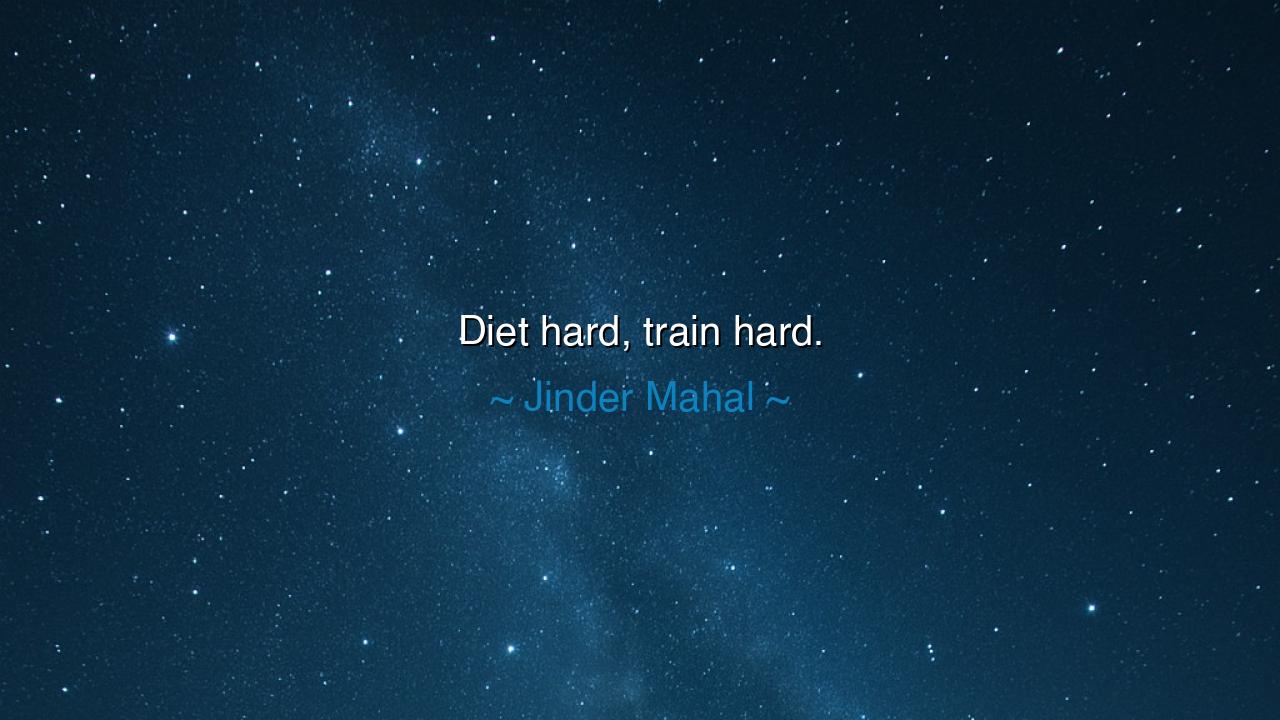
Diet hard, train hard.






“Diet hard, train hard.” — thus spoke Jinder Mahal, warrior of the modern age, whose body was forged not by chance, but by unrelenting discipline. His words are few, yet they carry the weight of mountains. For in those four syllables lies the essence of mastery: the harmony between sacrifice and strength, between the nourishment that enters the body and the fire that the body gives back to the world. To “diet hard” is to rule the inner kingdom; to “train hard” is to conquer the outer one.
In the world of the ancients, such a creed would have been spoken not in gyms, but on battlefields and in temples. The Spartan warriors, who were raised from youth to embrace hardship, lived by a similar truth. They ate sparingly, trained fiercely, and viewed comfort as the enemy of excellence. They knew that the flesh, when disciplined, becomes the servant of will — and that only through endurance is greatness born. So too does Jinder’s command echo this eternal law: that the body must be tempered like steel, through heat and hammer, until it shines with purpose.
To diet hard is not merely to abstain — it is to master desire. It is an act of patience and clarity, of choosing long-term strength over short-term pleasure. In this act, one learns the deeper art of self-control, which governs not just the body but the soul. For food is the first temptation of life, the earliest test of will. Those who learn to rule their appetite learn also to rule their destiny. When Jinder Mahal speaks of this, he speaks not only as an athlete but as a philosopher of effort, one who understands that the true battle begins not in the ring but at the table.
To train hard, then, is to test that mastery in motion. It is to take the energy earned through discipline and turn it into creation — muscle, endurance, resilience. The ancients spoke of the blacksmith forging the sword, each strike of the hammer shaping the metal into perfection. Training is this same sacred craft. Each repetition is a hammer blow upon the self, shaping strength, courage, and focus. To train hard is to embrace the pain that refines rather than destroys, to see struggle not as punishment but as the price of transformation.
Consider the story of Milo of Croton, the legendary wrestler of Greece. Each day, he lifted a calf upon his shoulders. As the calf grew into a bull, Milo’s strength grew with it. He did not seek shortcuts, nor did he surrender to fatigue. His power was born of consistency — the same daily ritual, the same burning effort. This is the ancient reflection of Jinder Mahal’s creed: progress is not achieved through luck, but through unyielding dedication to simple, enduring principles — eat wisely, train fiercely, live consciously.
Yet the deeper meaning of this quote is not limited to physical strength. It speaks to every domain of life. To diet hard in spirit is to consume only what nourishes the soul — truth, compassion, wisdom — and to reject the poisons of envy and doubt. To train hard in heart and mind is to practice integrity, courage, and resilience until they become second nature. The outer discipline mirrors the inner one, and the man who controls his body learns also to control his fate.
Let this be the lesson, O seeker of strength: greatness is not built in ease, but in effort made sacred. When you eat, eat with intention; when you train, train with purpose. Refuse the path of comfort, for it breeds weakness. Embrace the path of struggle, for it breeds power. And remember always that true mastery is not a moment, but a lifetime of choices — choices made in hunger, in fatigue, in silence.
For in every age, from the warriors of Sparta to the athletes of today, the same truth endures: the body is the forge, discipline the flame, and will the hammer. Diet hard, train hard — and in doing so, you shall not only sculpt the flesh but awaken the spirit, until you too stand unshaken, like steel that has met the fire and learned to shine.






AAdministratorAdministrator
Welcome, honored guests. Please leave a comment, we will respond soon